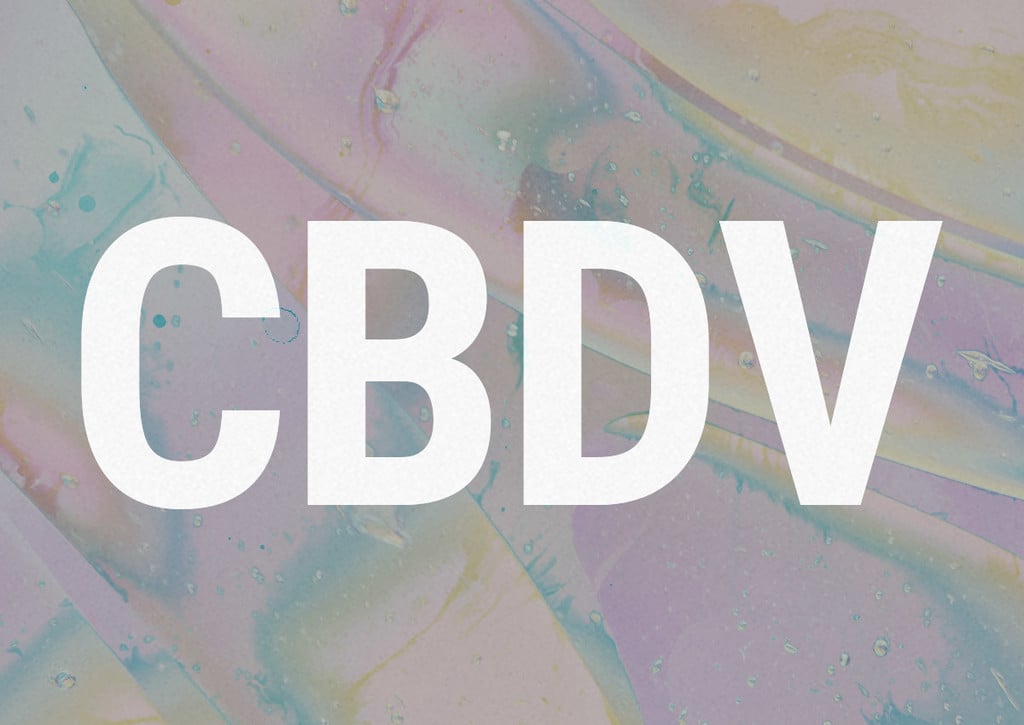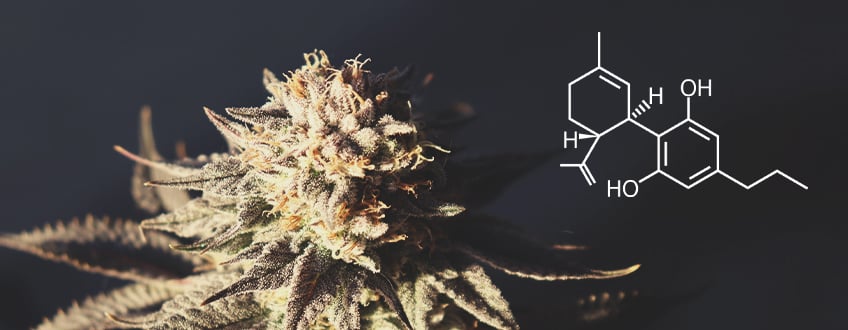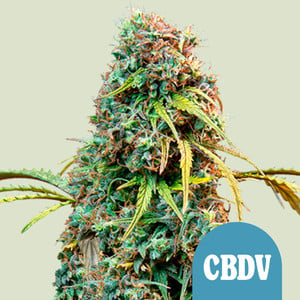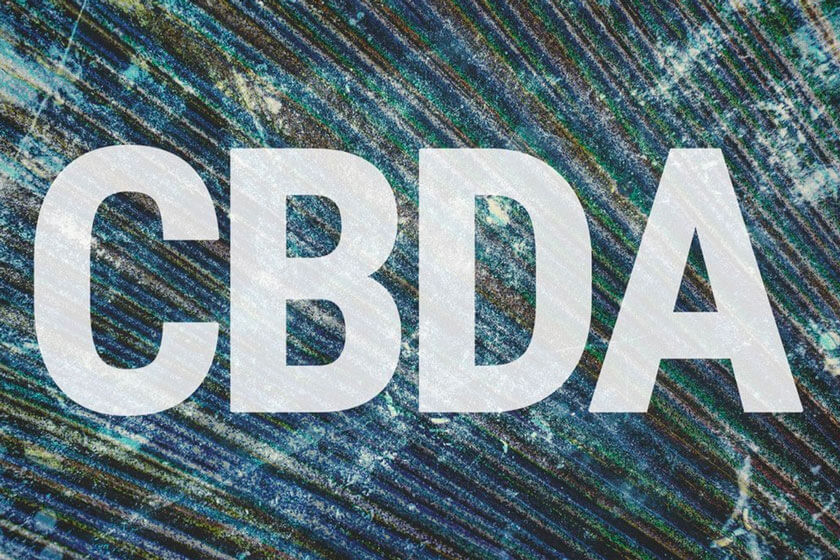.

What Is Cannabidivarin (CBDV)?
When we talk about the compounds in cannabis, it's easy to get hung up on THC and CBD. They are, after all, the main constituents of the plant. However, there are hundreds of compounds in cannabis that, despite their small presence, can have a big impact on how the plant affects us. Cannabidivarin, or CBDV, is one such chemical.
THC and CBD have stolen the spotlight of the cannabis conversation. This ancient plant contains hundreds of compounds, many of which can interact in unique ways to deliver endless benefits. In this article, we’ll take a close look at cannabidivarin, or CBDV, one highly underestimated cannabinoid with a ton of potential.
Contents:
What Is CBDV?
CBDV is one of over 100 cannabinoids produced by the cannabis plant. Like other “secondary” cannabinoids, CBDV is usually found in lower concentrations than THC and CBD, and typically tends to be more present in low-THC cannabis varieties, such as hemp.
CBDV is a non-intoxicating cannabinoid, meaning it doesn’t produce the euphoric high or sleepy stone we typically associate with cannabis varieties rich in THC. CBD is a homolog to CBDV, and both compounds share very similar chemical structures and mechanisms of action, which we will look at in more detail below.
How Does CBDV Work?
Like with many cannabinoids, there’s still a lot we do not know about CBDV and its mechanisms of action. However, preliminary trials on this cannabinoid give us at least some idea of how it might act on the human body.
Like its cannabinoid cousin (CBD), CBDV doesn’t show a high affinity for cannabinoid receptors CB1 or CB2. This is one of the main reasons it does not produce the intoxicating effects typically associated with cannabis.
Studies suggest that, like CBD, cannabidivarin might act on other chemical pathways and interact with the human endocannabinoid system in a much more indirect fashion. For example, clinical trials[1] investigating CBDV’s efficacy in treating convulsions and epilepsy symptoms suggest that CBDV both activates and desensitises TRPV1 receptors (also known as capsaicin receptors), which play a key role in our ability to sense pain and perceive temperature. Other studies show that CBDV may act on TRPV2 and TRPA1 receptors.
All of these receptors fall under the category of transient receptor potential channels[2]. These channels are embedded into the cell membrane and, when activated, open to allow ions (such as sodium, for example) to flow into a cell.
Research also suggests that CBDV may interfere with the activity of diacylglycerol lipase, one of the key enzymes involved in the synthesis of 2-AG, an endocannabinoid naturally produced by the body. How CBDV does this, however, isn’t entirely clear.
Royal CBDV Automatic
|
|
Solomatic x Durban Poison |
|
|
13 to 16 oz/m² |
|
|
2 to 3 feet |
|
|
35 - 40 days |
|
|
THC: 0,3% |
|
|
Sativa 75%, Indica 20%, Ruderalis 5% |
|
|
4 to 5 oz/plant |
|
|
3 feet |
|
|
Clear, Physically Relaxing |
|
|
55 - 65 days after germination |
What Does CBDV Do?
CBDV has been the focus of a variety of different trials and studies. Unfortunately, however, we still know even less about this cannabinoid, its mechanisms of action, and its therapeutic potential than we do about CBD.
Below, we’ll take you through some of the research on CBDV, and examine what this tells us about its function and potential. Keep in mind, however, that all of these results are preliminary.
-
CBDV and Epilepsy
In 2013, the British Journal of Pharmacology published a study[3] examining the effects of CBDV on rats and mice. The animals were given cannabis plant-derived extracts (in various doses) that were rich in CBDV and also contained CBD, as well as pure forms of both cannabinoids. The researchers also used an isobologram analysis to determine how the two cannabinoids interact, and to get a better understanding of their individual effects on the body.
The rats and mice were then made to have seizures using pentylenetetrazole (a circulatory and respiratory stimulant), pilocarpine, and an audiogenic seizure model (in which the animals are placed in an isolated chamber and exposed to an acoustic stimulus that evokes a seizure). The researchers used this to determine the anticonvulsant potential of CBDV-rich extracts, and the results from the isobologram analysis showed that the cannabinoid delivered its effects without acting on CB1 receptors.
In 2014, the ACS Chemical Neuroscience journal also published a study[4] examining the anticonvulsant potential of CBDV. This study concluded that CBDV’s effects were delivered via TRP channels (as described earlier).
-
CBDV and Autism
Given CBDV’s potential in modulating the excitatory and inhibitory systems in the brain, some studies have looked into its therapeutic potential in addressing the core symptoms of autism spectrum disorder.
In 2019[5], the journal of Translational Psychiatry took this premise and put it to the test by seeing if CBDV could affect glutamate and GAMA metabolites (markers of the brain’s inhibitory or excitatory systems) both in healthy individuals and patients with autism spectrum disorder. The study followed a double-blind, randomised-order, cross-over design, and used magnetic resonance spectroscopy to measure the glutamate and GABA+ levels in the brains of 34 male participants (17 with autism and 17 without) following treatment with a placebo and a single dose of 600mg of CBDV.
The study’s researchers claim that CBDV did have an effect on glutamate levels in the brains of both groups of participants. Unfortunately, its effects were not uniform across all individuals, and the authors concluded that further studies were needed to properly determine CBDV’s potential as a treatment for the symptoms of autism spectrum disorder.
-
CBDV and Nausea
Many people report using cannabis when experiencing an upset stomach, nausea, or vomiting. Hence, there’s been a growing interest in testing how cannabinoids might interact with our body’s natural nausea response.
In 2013, the British Journal of Pharmacology published a comparative study[6] examining CBDV’s antiemetic potential in animal models of nausea. The authors of the study first used two inverse agonists of the CB1 receptor to induce nausea in lab rats. They then ran two experiments to see whether CBDV and THCV either induced nausea or reduced it. Ultimately, the study claims that neither THCV nor CBDV worked as CB1 reverse agonists, and as a result appeared to reduce markers associated with upset stomach in the test subjects.

-
CBDV and Rett Syndrome
Rett syndrome is a rare genetic mutation that mainly impacts women, affecting the development of their brains. The condition is characterised by profound disabilities that can affect a person’s ability to speak, coordinate their body, grow and develop properly, and more.
Since the endocannabinoid system mediates many of the biological functions that are impaired by Rett syndrome, researchers decided to test the effectiveness of cannabinoids in the treatment of this condition. In particular, a 2018 study[7] published in the journal Neuropharmacology examined the effects of CBDV on an animal model of Rett syndrome. After 14 days of treatment with CBDV, researchers noted a general improvement in the health status of the mice, as well as improvements in behavioural impairment and slowed brain atrophy.
Note: While the above research is exciting and interesting, it’s far from enough to draw any concrete conclusions about CBDV and its potential health benefits. Remember, we know far less about this compound than we do about other cannabinoids, and a lot more research is needed to better understand its full scope of effects.
Does CBDV Have Any Side Effects?
CBDV hasn’t been shown to produce any side effects. However, that doesn't mean it is necessarily devoid of any adverse outcomes. We simply need more research to determine this cannabinoid’s safety profile.
What's the Difference Between CBD and CBDV?
Many people confuse CBD and CBDV, but remember that cannabidiol and cannabidivarin are separate chemical compounds. While they share many similarities (like coming from the same plant and having an almost identical chemical structure), they are still distinct, each with unique properties and effects.
Also remember that CBD and CBDV appear to have similar mechanisms of action in the body and, when taken in conjunction, may have a stronger effect than if taken in isolation.
Which Cannabis Strains Have High CBDV Content?
Some preliminary research suggests that CBDV is more present in indica cannabis strains, especially those native to India, Nepal, Pakistan, and other parts of the Indian subcontinent. However, there isn’t any real proof that this is true.
Instead, we recommend sourcing CBDV from strains such as CBDV Automatic from RQS. This cultivar has been bred specifically to display high levels of both CBD and CBDV, making it a good option for those looking to enjoy the non-psychotropic benefits both cannabinoids have to offer.
- Nonpsychotropic plant cannabinoids, cannabidivarin (CBDV) and cannabidiol (CBD), activate and desensitize transient receptor potential vanilloid 1 (TRPV1) channels in vitro: potential for the treatment of neuronal hyperexcitability - PubMed https://pubmed.ncbi.nlm.nih.gov
- Cannabidivarin-rich cannabis extracts are anticonvulsant in mouse and rat via a CB1 receptor-independent mechanism - PubMed https://pubmed.ncbi.nlm.nih.gov
- Cannabidivarin-rich cannabis extracts are anticonvulsant in mouse and rat via a CB1 receptor-independent mechanism - PubMed https://pubmed.ncbi.nlm.nih.gov
- Nonpsychotropic plant cannabinoids, cannabidivarin (CBDV) and cannabidiol (CBD), activate and desensitize transient receptor potential vanilloid 1 (TRPV1) channels in vitro: potential for the treatment of neuronal hyperexcitability - PubMed https://pubmed.ncbi.nlm.nih.gov
- Effects of cannabidivarin (CBDV) on brain excitation and inhibition systems in adults with and without Autism Spectrum Disorder (ASD): a single dose trial during magnetic resonance spectroscopy https://www.ncbi.nlm.nih.gov
- Evaluation of the potential of the phytocannabinoids, cannabidivarin (CBDV) and Δ(9) -tetrahydrocannabivarin (THCV), to produce CB1 receptor inverse agonism symptoms of nausea in rats - PubMed https://pubmed.ncbi.nlm.nih.gov
- Chronic treatment with the phytocannabinoid Cannabidivarin (CBDV) rescues behavioural alterations and brain atrophy in a mouse model of Rett syndrome - PubMed https://pubmed.ncbi.nlm.nih.gov






































